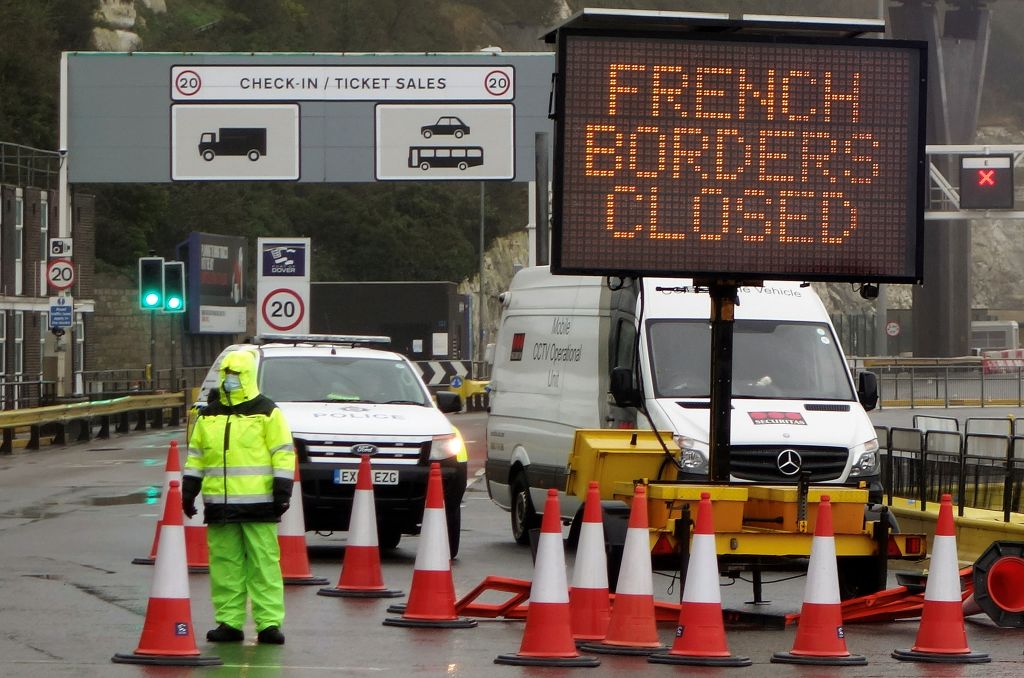The Port of Dover has been closed, with freight as well as passengers unable to cross the Channel, due to the new strain of Covid concentrated in London and the South East. So how long before supermarket shelves are empty? A lot depends on the behaviour of British consumers.
As has been proved on a number of occasions, such as with lavatory paper at the beginning of the spring lockdown and with petrol during the fuel protests in 2000, you don’t need an actual shortage of goods to result in apparent shortages – panic-buying can lead to empty shelves within hours, if people are minded to stock up their freezers and larders to a level they would not normally do.
Yet Britain really is painfully dependent on imports of many kinds of food. We import 84 per cent of fresh fruit consumed here, 47.5 per cent of vegetables, 37.7 per cent of pork, 29 per cent of potatoes, 18.5 per cent of wheat, 11.3 per cent of eggs and 10.6 per cent of poultry. We should, on the other hand, be okay for lamb – of which we import only 0.2 per cent – and milk, of which we produce 5.9 per cent more than we consume. Most food imports come from the EU, which accounts for 26 per cent of all food consumed in Britain.
As regards fresh fruit and vegetables, the problem is more acute than the above figures suggest – in winter we are even more dependent on imports from southern Spain, as we discovered when that part of the world was hit by heavy rain and flooding a couple of years ago. Sainsbury’s this morning has warned that lettuce, cauliflower, broccoli and citrus fruit will begin to run out ‘over the next few days’ if cross-Channel traffic is not restored. Initially, the ban on accompanied freight from France has been imposed for 48 hours, although this may of course be extended – the mutant strain of virus isn’t going to disappear in that timeframe.
Not all freight has been affected by the emergency restrictions. It only affects accompanied freight – i.e. that being carried in lorries where the driver travels with the goods. Eighty per cent of freight arriving in the UK is unaccompanied – i.e. it arrives in containers. However, food imports are concentrated in the former category, and are especially concentrated on Dover. In 2019, 2.4 million lorries passed through Dover, an average of 6,600 a day.
What we don’t know is how Christmas and Brexit will affect demand for food. At this time of year it is normal for consumers to stock up more food and drink than they usually do. If fridges and freezers are already full, there is a limit to how much extra food people are likely to want to buy. Then again, no-one knows how much food shopping people are going to want to do over the next few days as a result of forced changes to their Christmas plans. Supermarkets are used to stocking up for the Christmas season, and coping with reduced lorry movements over the holiday period. Moreover, this year all retailers have been stocking up as best they can in preparation for a no-deal Brexit, which remains a very strong possibility. That is why there have been huge queues of lorries either side of the Channel ports.
The biggest problems with food supplies, then, are unlikely to be this week – they are more likely to occur after Christmas, if freight traffic remains blocked. On the positive side, the crisis created by the variant strain of Covid has greatly increased the likelihood of an emergency extension to the Brexit transitional arrangements, which could put off the threat of no deal-related chaos for another day.







Comments